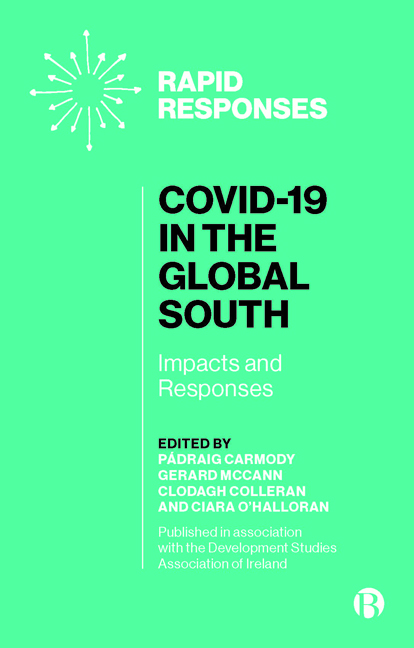10 - COVID-19 in Latin America: Uneven Responses, Uneven Impacts, Shared Challenges
Published online by Cambridge University Press: 23 March 2021
Summary
The ongoing crisis created by the arrival of the COVID-19 virus (the Corona crisis as some have labelled it) has revealed and exacerbated pre-existing inequalities throughout the world in terms of income, gender and race. This is illustrated graphically in Latin America, considered by the World Health Organization (WHO) at the time of writing as an ‘intense zone’ for COVID-19 transmission (UN News, 2020). According to Sánchez-Ancochea (2020):
80% of individuals in the bottom quintile of the population work in the informal sector. Almost one fourth of all Latin Americans have no access to potable water, a third has no access to the internet, and many live in low quality housing – with dramatic consequences not only for their income opportunities but also for their health during the pandemic.
This graphic situation of inequality presents difficult choices for Latin American governments in their policy responses to the pandemic, particularly with regard to the most severe of these ‘lockdowns’ – that is, national shutdowns of all but essential economic and social activity combined with stay at home orders for most of the population. On the one hand, not imposing lockdowns can risk the rapid spread of the virus; on the other, the stark context of inequality alongside poorquality, sparse and badly equipped and funded health and public services make lockdowns difficult to implement in an effective manner, and may exacerbate poverty and inequality further. Additionally, their cost may add to existing state debt burdens already being repaid with great difficulty and at a high social cost. All these issues have contributed to the uneven outcomes of virus management efforts in the region.
This chapter will briefly examine these issues in the context of Latin America in the following order: the political, social and economic background preceding the emergence of COVID-19 in the region; the range of measures used to contain the virus, particularly lockdowns and any compensatory policy packages introduced to mitigate their negative socioeconomic impacts, assessing the impact and effectiveness of both; and, some policy responses being discussed for the medium to long term on how to address the inequalities made more urgent by the pandemic.
- Type
- Chapter
- Information
- COVID-19 in the Global SouthImpacts and Responses, pp. 105 - 114Publisher: Bristol University PressPrint publication year: 2020



